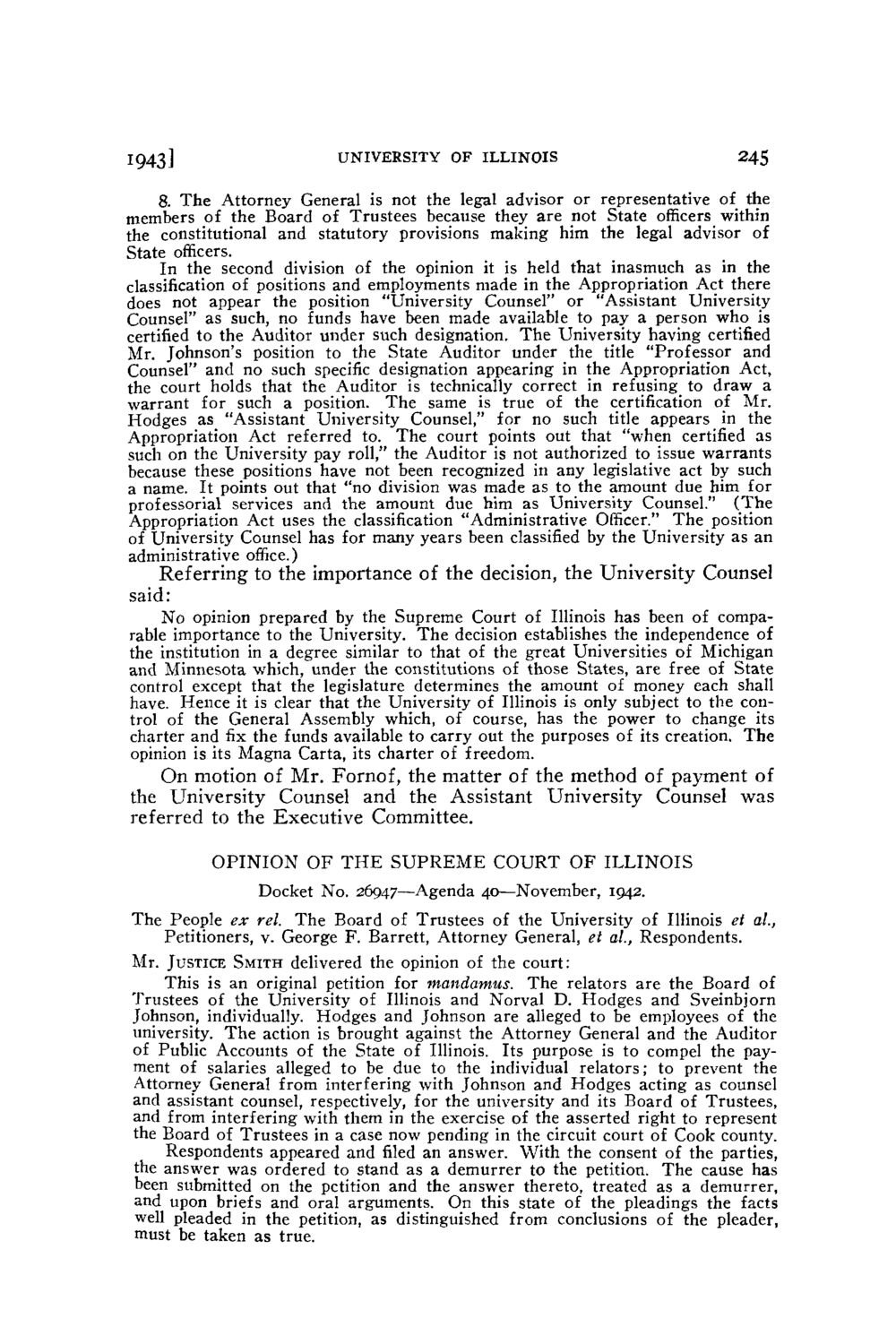| |
| |
Caption: Board of Trustees Minutes - 1944
This is a reduced-resolution page image for fast online browsing.

EXTRACTED TEXT FROM PAGE:
1943] UNIVERSITY OF ILLINOIS 245 8. T h e Attorney General is not the legal advisor or representative of the members of the Board of Trustees because they are not State officers within the constitutional and statutory provisions making him the legal advisor of State officers. In the second division of the opinion it is held that inasmuch as in the classification of positions and employments made in the Appropriation Act there does not appear the position "University Counsel" or "Assistant University Counsel" as such, no funds have been made available to pay a person who is certified to the Auditor under such designation. T h e University having certified Mr. Johnson's position to the State Auditor under the title "Professor and Counsel" and no such specific designation appearing in the Appropriation Act, the court holds that the Auditor is technically correct in refusing to draw a warrant for such a position. The same is true of the certification of Mr. Hodges as "Assistant University Counsel," for no such title appears in the Appropriation Act referred to. The court points out that "when certified as such on the University pay roll," the Auditor is not authorized to issue warrants because these positions have not been recognized in any legislative act by such a name. It points out that "no division was made as to the amount due him for professorial services and the amount due him as University Counsel." ( T h e Appropriation Act uses the classification "Administrative Officer." The position of University Counsel has for many years been classified by the University as an administrative office.) R e f e r r i n g t o t h e i m p o r t a n c e of t h e d e c i s i o n , t h e U n i v e r s i t y C o u n s e l said: No opinion prepared by the Supreme Court of Illinois has been of comparable importance to the University. T h e decision establishes the independence of the institution in a degree similar to that of the great Universities of Michigan and Minnesota which, under the constitutions of those States, are free of State control except that the legislature determines the amount of money each shall have. Hence it is clear that the University of Illinois is only subject to the control of the General Assembly which, of course, has the power to change its charter and fix the funds available to carry out the purposes of its creation. T h e opinion is its Magna Carta, its charter of freedom. O n m o t i o n of M r . F o r n o f , t h e m a t t e r o f t h e m e t h o d of p a y m e n t of the U n i v e r s i t y Counsel a n d the A s s i s t a n t U n i v e r s i t y C o u n s e l w a s referred to the Executive Committee. OPINION OF T H E SUPREME COURT OF ILLINOIS Docket No. 26947—Agenda 40—November, 1942. The People ex rel. The Board of Trustees of the University of Illinois et at., Petitioners, v. George F . Barrett, Attorney General, et a!., Respondents. Mr. JUSTICE SMITH delivered the opinion of the court: This is an original petition for mandamus. The relators are the Board of Trustees of the University of Illinois and Norval D. Hodges and Sveinbjorn Johnson, individually. Hodges and Johnson are alleged to be employees of the university. T h e action is brought against the Attorney General and the Auditor of Public Accounts of the State of Illinois. Its purpose is to compel the payment of salaries alleged to be due to the individual relators; to prevent the Attorney General from interfering with Johnson and Hodges acting as counsel and assistant counsel, respectively, for the university and its Board of Trustees, and from interfering with them in the exercise of the asserted right to represent the Board of Trustees in a case now pending in the circuit court of Cook county. Respondents appeared and filed an answer. With the consent of the parties, the answer was ordered to stand as a demurrer to the petition. The cause has been submitted on the petition and the answer thereto, treated as a demurrer, and upon briefs and oral arguments. On this state of the pleadings the facts well pleaded in the petition, as distinguished from conclusions of the pleader, must be taken as true.
| |